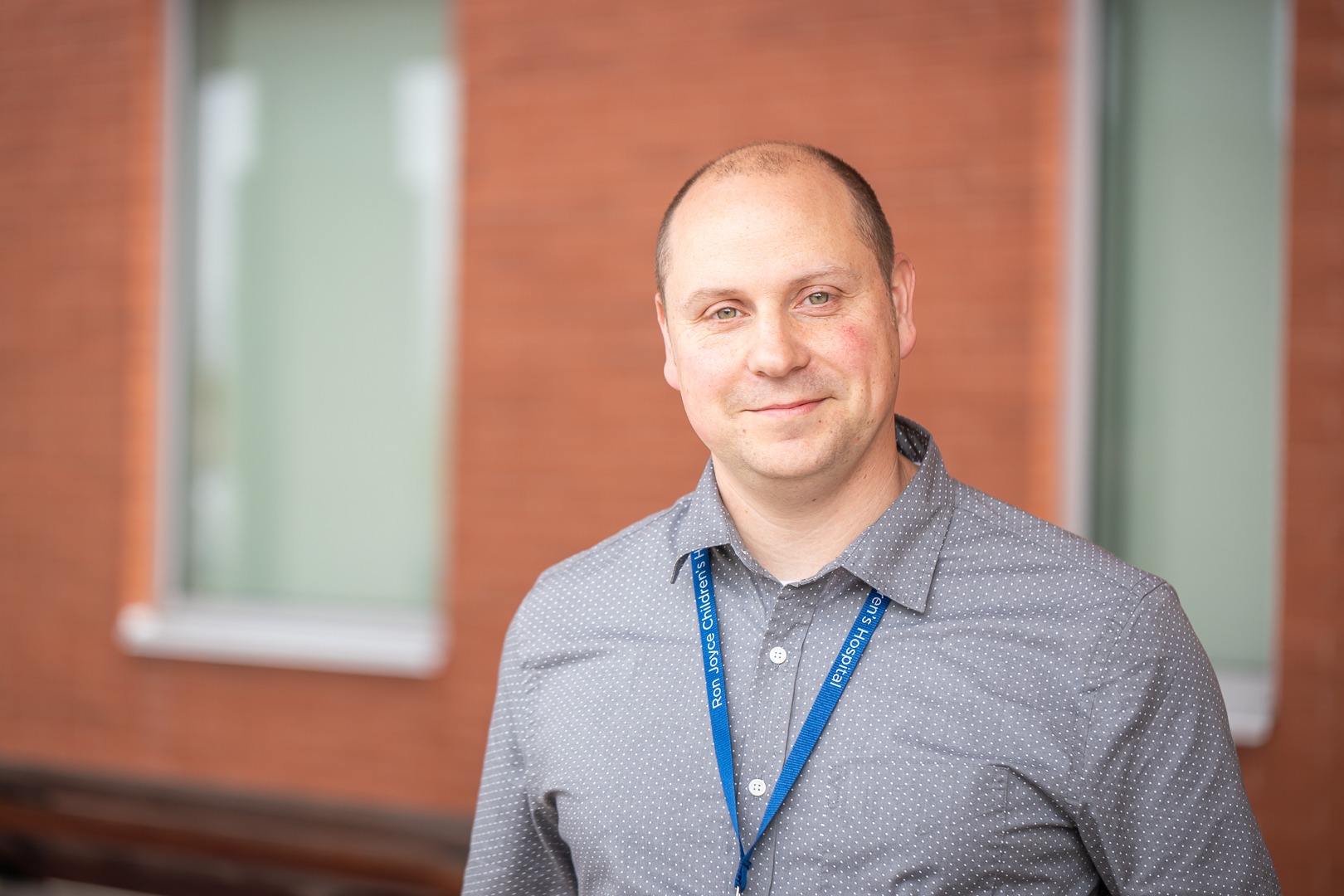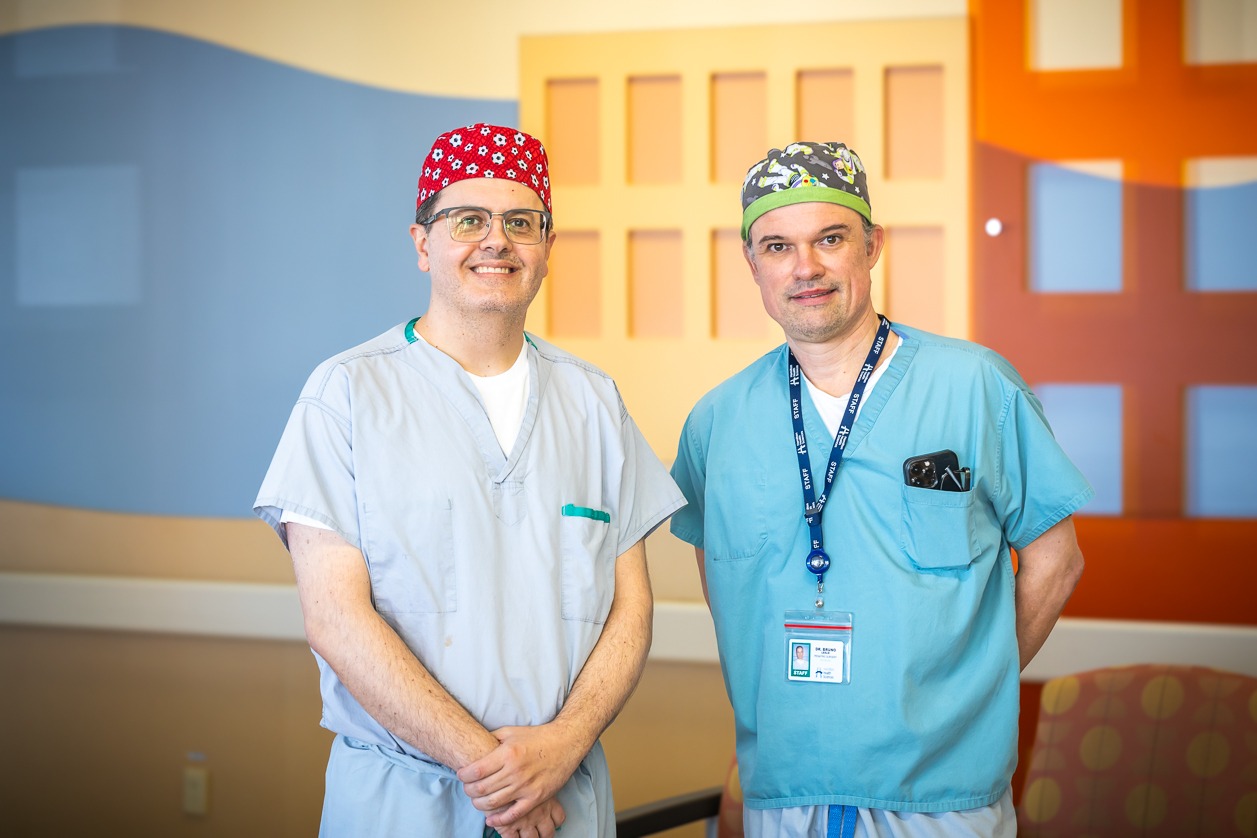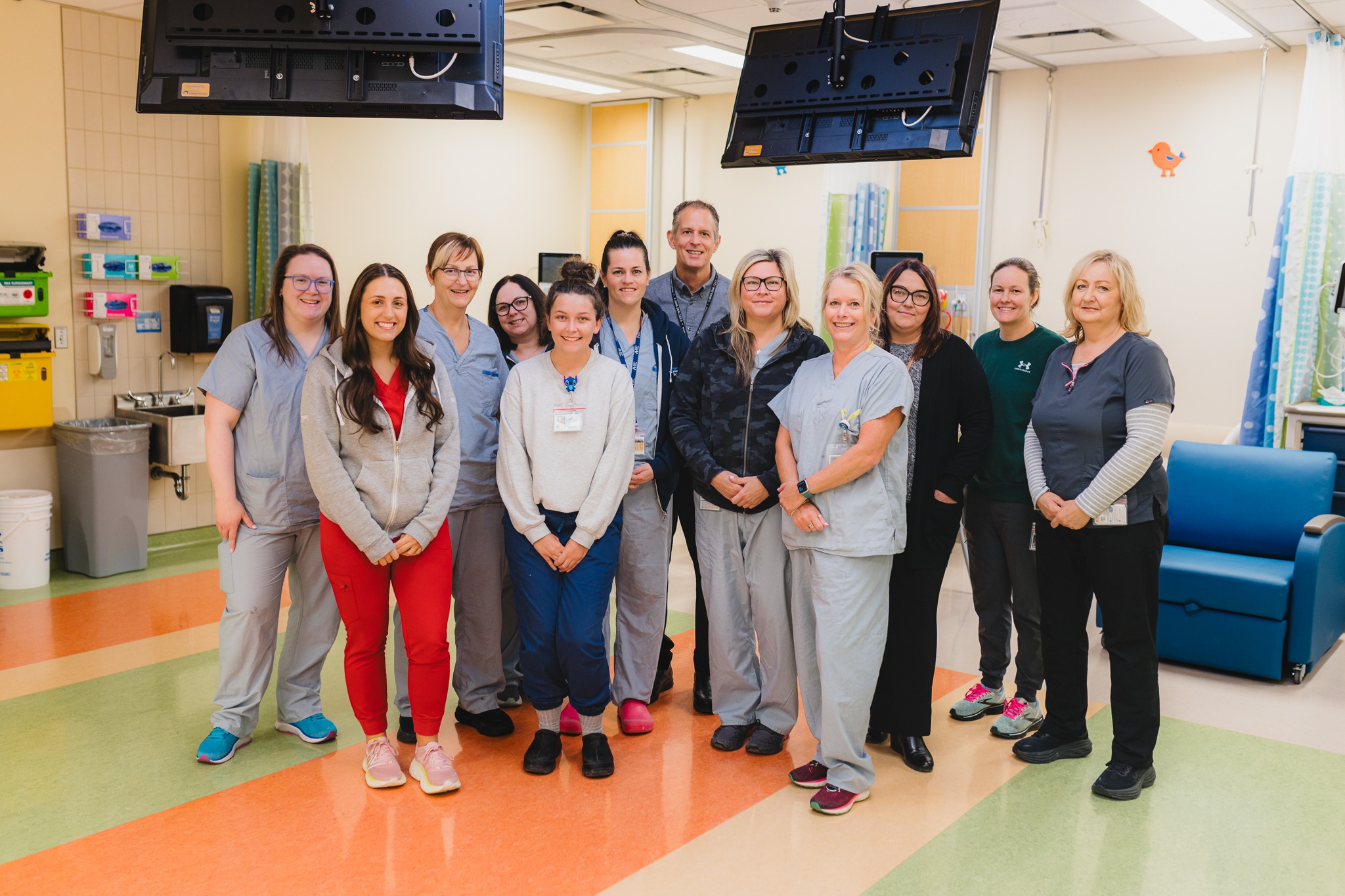
Babies get faster care from expanded newborn screening program
Like most babies, Nathan Bonner had the heel of his tiny foot pricked to collect a drop of blood when he was just a day old, as part of routine newborn screening. The blood sample was shipped from his local hospital in Oakville to the central Newborn Screening Ontario lab in Ottawa. The test came back with a screen positive result for a metabolic disorder called phenylketonuria (PKU), so Nathan was referred to Hamilton Health Sciences’ McMaster Children’s Hospital (MCH), one of five hospitals in Ontario with a newborn screening program, for follow-up care.
A genetic counsellor called Nathan’s parents to share the screening results when he was just six days old. That same afternoon, his parents brought him to MCH’s Genetics & Metabolics clinic for further testing, which led to his confirmed diagnosis of PKU. With this condition, the body is unable to break down an amino acid called phenylalanine. Without immediate discovery and treatment, infants can develop rashes, seizures and permanent brain damage. With early diagnosis and treatment, babies with PKU have normal development like their peers.
“We were in shock, but we felt like we were in good hands from day one,” says Nathan’s mom Stephanie.

MCH registered dietitian Amy Pender has worked closely with Nathan and his family over the past year.
A restricted diet, daily tracking and weekly blood work
The main treatment for PKU is a very restricted low protein/low phenylalanine diet that Nathan will have to continue for the rest of his life to prevent brain damage caused by the build-up of phenylalanine.
“Treatment involves eliminating all high protein foods, tracking protein intake daily, and including specialized metabolic formula to support normal growth and development,” says registered dietitian in the Genetics & Metabolics clinic, Amy Pender. “Patients like Nathan complete weekly blood work to monitor the level of phenylalanine in their blood. This allows us to adjust the diet to ensure that levels are in a safe range to prevent serious health issues.”
Feeling included at the table
With PKU, Nathan can’t eat regular sources of protein, including meats and fish, eggs, dairy, or even bread, pasta and rice. Instead, phenylalanine-free PKU formula will be a life-long part of Nathan’s diet to meet his protein needs.
Some of the high protein foods can also be replaced with specialty low protein foods, most of which are OHIP-covered, from the National Food Distribution Centre, a non-profit organization solely dedicated to the distribution of products for people with metabolism health issues. They have replacement low protein pastas and breads, “chicken burgers” and “hotdogs” made from vegetables, and baking mixes for special occasions.
But dinners in Nathan’s household don’t look so different – and that’s very intentional. Nathan’s parents Stephanie and Ashley devote time to meal planning. They try to replicate, as best as possible, what the rest of the family is eating, down to the shape of the pasta.
“He’s now a year old, so he points at our food and wants what we have,” says dad Ashley. “We want him to feel included around the table.”
Putting that meal on the table involves a ton of forethought and effort. Nathan’s food has to be measured at each meal. It gets weighed before he starts and again if he’s left food behind, so his parents can keep track of exactly what he’s consuming.
The team at MCH helps Stephanie and Ashley understand their options through education and ongoing monitoring.
More staff means kids can access the care they need, faster
Since the launch of MCH’s newborn screening program in 2006, the number of conditions screened for has grown significantly from two to around 30, and the number of infants referred to MCH with positive screening results has also continued to grow. MCH provides follow-up care to about 150 babies with screen positive results each year, out of approximately 25,000 babies born and screened within our catchment area annually.
It’s a very small group – less than one per cent of babies receive a positive newborn screening result. When they receive a patient referral to the Genetics & Metabolics clinic, staff work with doctors from the appropriate clinics, such as metabolics, respirology, endocrinology, hematology or immunology, depending on what condition the baby screened positive for.
“PKU affects about 1 in every 12,000 babies born in Ontario,” says Pender. “At MCH, we follow approximately 85 patients with PKU and phenylalanine disorders.” And that’s just one type of condition the staff in the genetics and metabolics clinic care for.
A historic provincial investment in MCH has allowed the hospital to expand services, spaces and staff to meet the needs of patients and families. As a result, the newborn screening program added several part-time staff to the team, including a nurse, dietetic assistant, genetics assistant, and social worker. This additional support means more timely follow-up for infants with positive newborn screening results so they can get the diagnostic testing they need, and earlier treatment for those who go on to have a diagnosis confirmed.
“The philosophy is everybody has a different body and everybody has a different diet and that’s just part of Nathan’s life.”
Allison Pottinger is the new dietetic assistant who supports Pender, who follows over 250 patients with different life-saving metabolic diets requiring close management.
Pottinger’s role includes ordering specialized metabolic formulas and foods; ensuring inpatients receive the correct formulas and foods while admitted to hospital; communicating information to patients on behalf of the team; requesting and calculating a patient’s food record so the team has accurate data to adjust care plans as needed; and creating and sharing resources and product lists with families about their specialized diets.
“I love connecting with families and feeling that my work matters,” she says. “Being able to collaborate with the dietitian and my team to address patient concerns is very rewarding.”
Registered nurse Rebecca Carpenter also recently joined the clinic. Her role is to facilitate diagnostic testing for newborns through the Newborn Screening Program; care for patients during their appointments and manage their ongoing treatment plans; educate families about metabolic disorders and connect them with resources; and offer emotional support.
Patient advocacy is also a huge part of her role, which includes applying for funding, facilitating referrals to other teams, and working with schools and workplaces to accommodate a patient’s needs. This involves working with other health care professionals, advocating for policy changes, and empowering families to become advocates for themselves.
“The new funding brings immense opportunities for our clinic and program. It allows us to expand our services, hire additional staff to support, and enhance our screening capabilities in all areas of our clinic,” says Carpenter. “This funding also means improved efficiency, better access to care for our families, and ultimately, a higher standard of service.”
Every body is different
 Nathan has an older brother Jake, who like most children, has a less restricted diet. His parents often wonder how they’ll approach allowing Jake to have certain foods and not Nathan as the boys get older. The family has learned to be compassionate and accept that their diet will be different compared to Nathan’s. This means older brother Jake can still have dessert after dinner, and the rest of the family needs protein in their diet to stay healthy.
Nathan has an older brother Jake, who like most children, has a less restricted diet. His parents often wonder how they’ll approach allowing Jake to have certain foods and not Nathan as the boys get older. The family has learned to be compassionate and accept that their diet will be different compared to Nathan’s. This means older brother Jake can still have dessert after dinner, and the rest of the family needs protein in their diet to stay healthy.
While it’s a difficult road to navigate, Pender taught the family to have a positive perspective.
“The philosophy is everybody has a different body and everybody has a different diet and that’s just part of Nathan’s life,” says Ashley. “As Nathan gets older, he’ll have to be comfortable with who he is and what his differences are.”
While everyone is different, they want their son to feel included.
“We worry about when he goes to school and the social aspects of growing up,” says Ashley. “Can he have pizza on Pizza Day? Are there options for that?”
To the health-care team, the small joys are important, too. Pottinger has been working on a list of low protein foods available in local grocery stores and food options that can be used for special occasions, like pizza day, while fitting within the PKU diet for children like Nathan.
Nathan is starting daycare soon, so his caregivers will be informed about his needs and ways to support him.
While PKU is a lifelong condition, there is a medication treatment that may or may not work when used in conjunction with the PKU diet.
“We hope to trial this treatment with Nathan in the coming months,” says Pender.
Stephanie and Ashley’s main goal is for Nathan to feel comfortable and confident when he goes to school.
“We just hope he has the confidence going through life to feel like himself,” says Ashley. “I imagine we’re a rarity in the population but the fact that there’s investment in this area and that we have support is just awesome. We’re just so thankful for that.”










